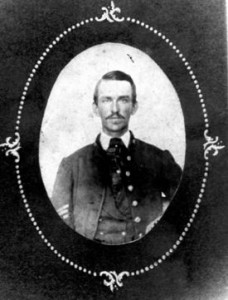As the first light of dawn pierces the morning sky, Confederate troops stationed atop Marye’s Heights and behind a stone wall along a sunken road at the base of the hill peer anxiously towards Fredericksburg. The previous day the Federal Army of the Potomac had launched several massive, but unsuccessful, assaults across several hundred yards of open ground against this Confederate position. The Confederates fully expect the battle to resume today. Yet, as the morning sun grows brighter, no sign of an impending attack appears.
As the morning light brightens, the Confederate troops can clearly see the carnage they had inflicted upon the attackers the day before. On the bloody plain stretching out in front of the Confederate defenses are 1,000 dead and 7,000 wounded Federal soldiers. The moans and cries of these thousands of wounded waft across the battlefield in a pitiful chorus. Their exposed position makes medical attention or removal from the field impossible, their suffering unassuaged.
Standing behind the stone wall, Confederate Sergeant Richard Rowland Kirkland views the grisly spectacle as the tormented cries of the wounded pierce his ears. These wounded do not seem like enemies now, and their plight ignites feelings of mercy and compassion within him. Kirkland, nineteen years old, was born in Flat Rock, South Carolina and had attended the Flat Rock Baptist Church. He has developed a reputation of even temperament and religious devotion. Perhaps it is his faith that now compells him to act boldly and possibly sacrificially. Kirkland’s commanding officer, General Joseph Kershaw relates the story:
…In the afternoon the General [Kershaw] sat in the North room upstairs of Mrs Stevens’ House in front of the road, surveying the field, when Kirkland came up. With an expression of indignant remonstrance pervading his person, his manner and the tone of his voice, he said: “General, I can’t stand this” “What is the matter, Sergeant?” asked the General. He replied: ” All night and all day I have heard those poor people crying for water and can stand it no longer”, I came to ask permission to go and give them water.”
The General regarded him for a moment with feelings of profound admiration and said: “Kirkland, don’t you know that you would get a bullet through your head the moment you stepped over the wall?” ” Yes, Sir, he said, I know all about that, but if you will let me, I am willing to try it” After a pause the General said: ” Kirkland, I ought not to allow you to run such a risk, but the sentiment which actuates you is so noble, that I will not refuse your request, trusting that God may protect you. You may go.”
The Sergeant’s eyes lighted up with pleasure. He said “Thank you Sir” and ran rapidly down stairs. The General heard him pause for a moment and then return, bounding two steps at a time. He thought the Sergeant’s heart had failed him. He was mistaken. The Sergeant stopped at the door and said: “General, can I show a white handkerchief?” The General slowly shook his head, saying emphatically: “No, Kirkland, you can’t do that.’ “All right, Sir, he said, I’ll take my chances.” With profound anxiety, he was watched as he stepped over the wall on his errand of mercy, Christ-like mercy. Unharmed he reached the nearest sufferer. He knelt beside him, tenderly raised the drooping head, rested it gently upon his own noble breast, and poured precious life giving fluid down the fever scorched throat. This done he laid him gently down, placed his knap-sack under his head, straightened out his broken limb, spread his over-coat over him, replaced his empty canteen with a full one, and turned to another sufferer.
By this time his purpose was well understood on both sides and all danger was over. From all parts of the field arose fresh cries of “Water, for God’s sake, water!” More piteous still, the mute appeal of some one who could only feebly lift a hand to say, here too is life and suffering.
For and hour and a half did this ministering angle pursue his labor of mercy, nor ceased to go and return until he had relieved all of the wounded on that part of the field. He returned wholly unhurt. Who shall say how sweet his rest that Winter’s night beneath the cold stars…”
Kirkland’s actions at Fredericksburg earn him the nickname “The Angel of Marye’s Heights.” Unlike many other Civil War battlefields, Fredericksburg boasts few monuments. A monument commemorating the story of Kirkland, however, rests on the same plain on which he ministered–a poignant remembrance of one man’s mercy and kindness.
Unfortunately, Kirkland does not survive the war, falling at the Battle of Chickamuga in September, 1863. Death, however, cannot bury the memory of the soldier’s compassion and mercy.
Sources: Donald Pfanz, “The Angel of Marye’s Heights” (link); J. B. Kershaw, “Marye’s Heights” (link)
Article written by Dennis Sacrey, President of the Virginia Baptist Historical Society, and Church Administrator, Fredericksburg Baptist Church



